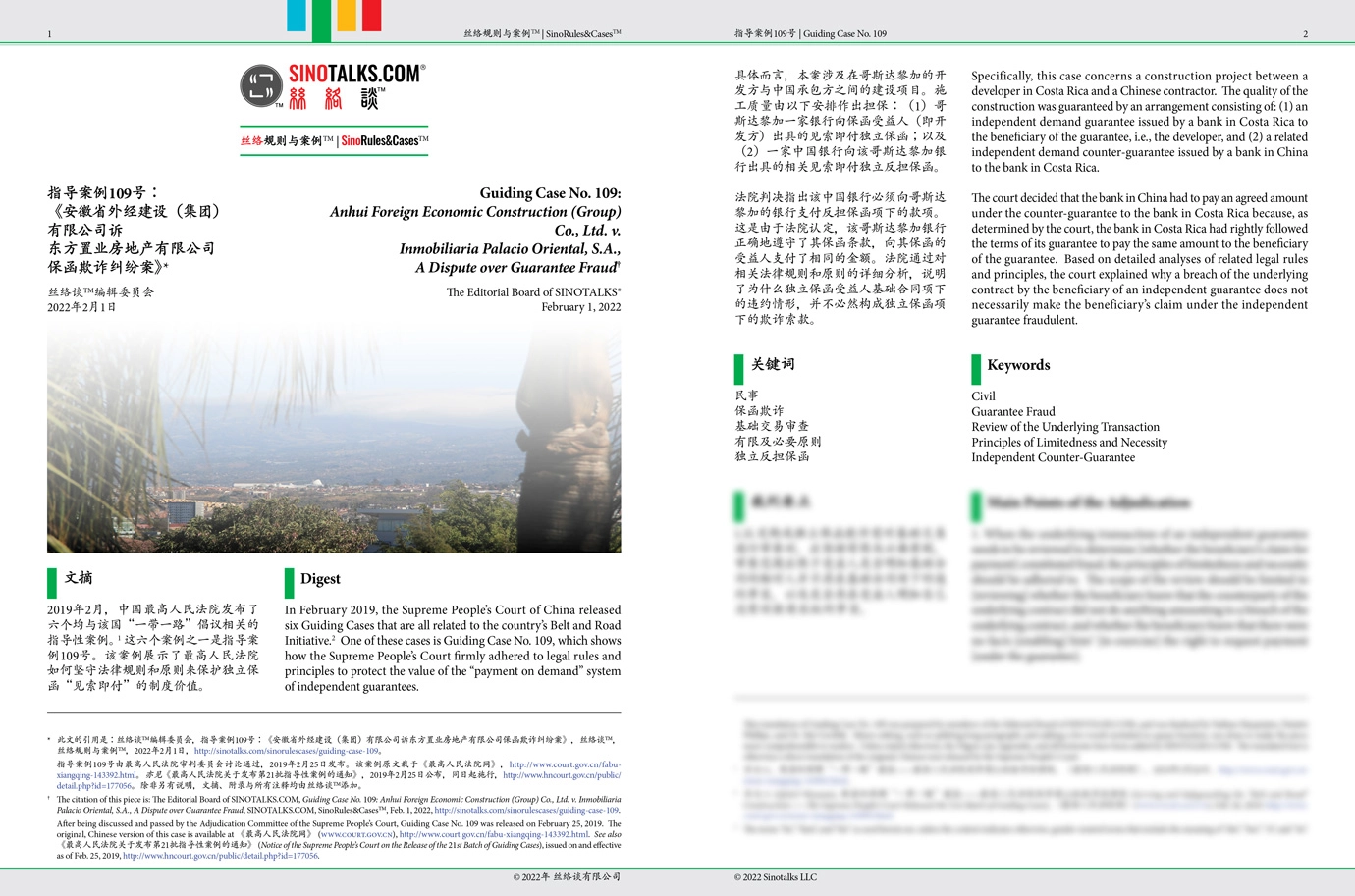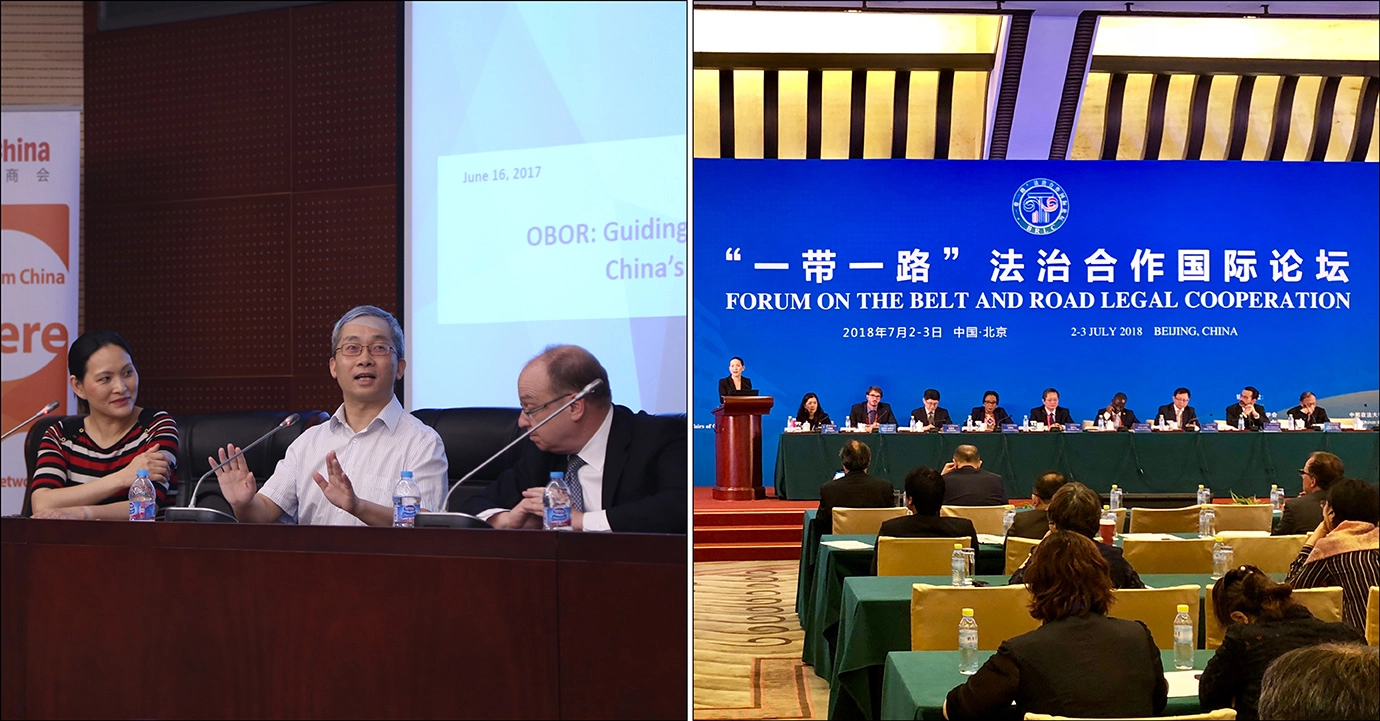Guiding Case No. 109:
Anhui Foreign Economic Construction (Group) Co., Ltd. v.
Inmobiliaria Palacio Oriental, S.A.,
A Dispute over Guarantee Fraud†
Table of Contents
- Digest
- Keywords
- Main Points of the Adjudication
- Related Legal Rule(s)
- Basic Facts of the Case
- Results of the Adjudication
- Reasons for the Adjudication
- Appendix 1
- Appendix 2
Number of Words (bilingual version)
- Approximately 16000

Digest
In February 2019, the Supreme People’s Court of China released six Guiding Cases that are all related to the country’s Belt and Road Initiative. One of these cases is Guiding Case No. 109, which shows how the Supreme People’s Court firmly adhered to legal rules and principles to protect the value of the “payment on demand” system of independent guarantees.
Specifically, this case concerns a construction project between a developer in Costa Rica and a Chinese contractor. The quality of the construction was guaranteed by an arrangement consisting of: (1) an independent demand guarantee issued by a bank in Costa Rica to the beneficiary of the guarantee, i.e., the developer, and (2) a related independent demand counter-guarantee issued by a bank in China to the bank in Costa Rica.
The court decided that the bank in China had to pay an agreed amount under the counter-guarantee to the bank in Costa Rica because, as determined by the court, the bank in Costa Rica had rightly followed the terms of its guarantee to pay the same amount to the beneficiary of the guarantee. Based on detailed analyses of related legal rules and principles, the court explained why a breach of the underlying contract by the beneficiary of an independent guarantee does not necessarily make the beneficiary’s claim under the independent guarantee fraudulent.
Keywords
Civil
Guarantee Fraud
Review of the Underlying Transaction
Principles of Limitedness and Necessity
Independent Counter-Guarantee
Main Points of the Adjudication
1. When the underlying transaction of an independent guarantee needs to be reviewed to determine [whether the beneficiary’s claim for payment] constituted fraud, the principles of limitedness and necessity should be adhered to. The scope of the review should be limited to [reviewing] whether the beneficiary knew that the counterparty of the underlying contract did not do anything amounting to a breach of the underlying contract, and whether the beneficiary knew that there were no facts [enabling] him [to exercise] the right to request payment [under the guarantee].
“A breach of the underlying contract by the beneficiary does not affect the beneficiary’s rights to submit transaction records and claim payment in accordance with the provisions of the independent guarantee.”
2. […]
3. […]
Related Legal Rule(s)
Article 8 and Article 44 of the Law of the People’s Republic of China on the Application of Laws to Foreign-Related Civil Relationships
Basic Facts of the Case
[…]
Results of the Adjudication
[…]
Reasons for the Adjudication
[…]
“[…] as the standards for identifying the guarantee fraud [alleged to be] involved [in this case] are not provided by the Uniform Rules for Demand Guarantees, they should be governed by the law of the People’s Republic of China.”
[…]
“[…] even if there is an ongoing litigation or arbitration process regarding an underlying contract, the realization of the beneficiary’s guarantee rights is not affected so long as the relevant dispute resolution process has not made a final decision determining that the debtor of the underlying transaction is not liable for making payment or compensation.”
[…]
Appendix 1
Law of the People’s Republic of China on the Application of Laws to Foreign-Related Civil Relationships
[…]
Appendix 2
Provisions of the Supreme People’s Court on Several Issues Concerning the Adjudication of Disputes over Independent Guarantees
[…]

† The citation of this piece is: The Editorial Board of SINOTALKS.COM, Guiding Case No. 109: Anhui Foreign Economic Construction (Group) Co., Ltd. v. Inmobiliaria Palacio Oriental, S.A., A Dispute over Guarantee Fraud, SINOTALKS.COM, SinoInsights™, Feb. 1, 2022, https://sinotalks.com/sinoinsights/guiding-case-109. After being discussed and passed by the Adjudication Committee of the Supreme People’s Court, Guiding Case No. 109 was released on February 25, 2019.
This translation of Guiding Case No. 109 was prepared by members of the Editorial Board of SINOTALKS.COM, and was finalized by Nathan Harpainter, Dimitri Phillips, and Dr. Mei Gechlik. Minor editing, such as splitting long paragraphs and adding a few words included in square brackets, was done to make the piece more comprehensible to readers. Unless stated otherwise, the Digest, any Appendix, and all footnotes have been added by SINOTALKS.COM. The translated text is otherwise a direct translation of the original, Chinese text released by the Supreme People’s Court.









